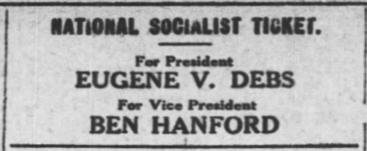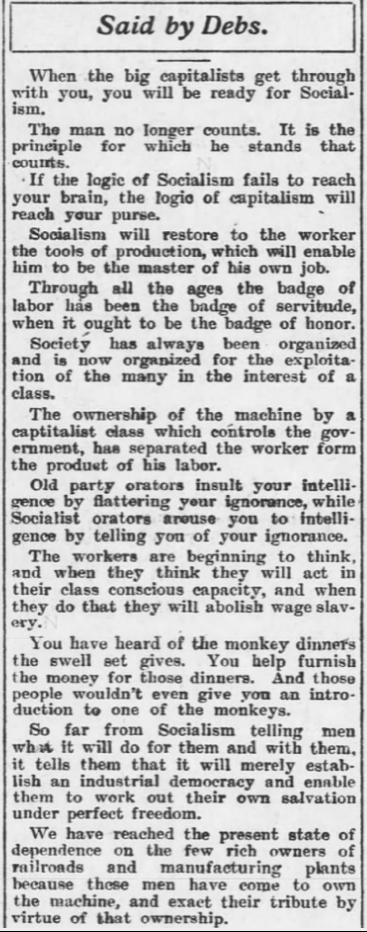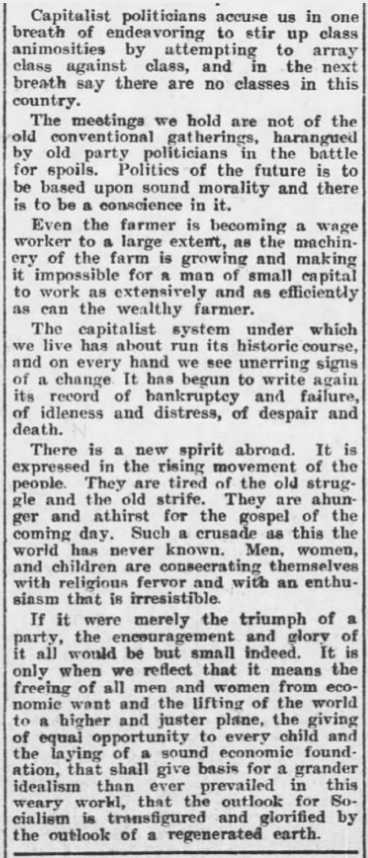
~~~~~~~~~~~~~~~~~~~~~~~~~~~~~~~~~~~~~~~~~~~~~
Hellraisers Journal – Tuesday October 6, 1908
The Red Special on the Northern Route Across the Plains

The Socialist Red Special carried the Debs Campaign across the plains from Spokane, homeward, via the northern route, arriving in Chicago on morning of September 25th, and, without so much as one full day of rest, headed out again to begin the eastern tour that same morning. The Chicago Tribune of September 26th reported that the Socialist Party’s candidate for President made 187 speeches and traveled 9,000 miles during the Campaign’s western tour.
From the Appeal to Reason of October 3, 1908:
BACK BY THE NORTH
—–
Red Special Re-crosses the Rockies and
Sweeps Across the States Toward
Michigan on Return Trip.
—–With the finish of the Red Special’s
western trip at Chicago, Sept. 25, it will
leave immediately through Indiana and Ohio
for a tour of the east.
—–
Spokane.
“Class conscious Socialism had its inning in Spokane last night when 3,000 people turned out at the Great Northern depot to greet Eugene V. Debs, Socialist candidate for president, upon the arrival here of his “Red Special,” and later when 4,000 people paid 15 and 25 cents each admission and contributed $203 additional in a voluntary collection to hear him deliver an address at the armory.”
The foregoing is the first paragraph of the Spokane Spokesman-Review’s three-column report of the meeting at that place. Although the train arrived three hours late the immense throng, composed almost wholly of workingmen, remained at the Great Northern depot and made the welkin ring with their cheers when the delayed special rolled in.
With the volunteer band at their head the thousands formed a procession and marched up town to the armory which had been secured for the meeting. George S. Boomer, editor of the Prosser Record and Socialist candidate for governor of Washington, was the first speaker, to be followed by Harry M. McKee, who accompanied the party from San Diego. These preliminary addresses occupied the time until 9 o’clock when Debs, who had been snatching a few hours much-needed rest, entered the hall and was greeted with a rousing cheer and introduced as the Martin Luther of the new protestant movement against capitalism and the Abraham Lincoln of the twentieth century.
In concluding its report of the meeting a local paper says: “Throughout his address Mr. Debs was frequently interrupted by applause and remarks of approval, and when he concluded, after talking an hour and fifteen minutes there was a rush of his auditors to the platform which for a moment completely engulfed him, but from which he was soon rescued and hastened away to his private car.”
His address was reproduced in a condensed form in the local papers which is the best possible indication that the people of Spokane want to know about this movement and to read the message delivered through its presidential candidate. The hypocritical pretentions of both Roosevelt and Bryan as friends and champions of the workers were held up to the ridicule and contempt they deserve, and at the same time the principles of Socialism were presented with a clearness that was evidently convincing from the resulting close attention and outburst of approval at the close.
At Spokane Ernest Untermann, Socialist candidate for governor of Idaho, came aboard to join in the trip across that state. The train left Spokane at 3 a. m. on the 17th, but moved at a snail’s pace that resulted in arrival at Butte twelve hours late. Instead of making Butte at 7:40 in the evening according to schedule, that place was not reached until seven the next morning.
Missoula.
All day the train crept over new track through the mountains, falling behind the scheduled time at every moment. The condition of the new road-bed was given as an excuse for the inefficiency of the service, but that condition was certainly not materially different at the time that the contract was made and the time of each proposed stop specified.
It is the opinion of railway men who know the road and understand the situation that the train was deliberately delayed by the management of Jim Hill’s system to prevent the meeting at Butte where the miners have recently been up against the class struggle in a strike. Although the delay was partly successful in queering the Butte meeting, it was in some respects an advantage. At Missoula, where a comparatively small crowd assembled at the regular time, 1 p. m., grew to thousands by 9 in the evening when the belated train arrived, the enthusiastic listeners thundered their approval at every reference to working-class supremacy.
When it is recalled that the American Railway Union once whipped Jim Hill in a great contest between the magnate and his workers, it is not so hard to understand why Debs has never been able to arrive on time at any of his meetings at points on the Hill lines.
The Town of Taft.
Earlier in the day the Red Special was privileged to pass through the town of Taft, so named from the Ohio gentleman who earned the republican presidential nomination with his services as minister plenipotentiary from the ruling class of America to the Vatican. The town of Taft enjoys the distinction of being the toughest municipality on the map. Thirty-five saloons were counted from the car window, and fallen women paraded the streets in the light of day in abbreviated attire that would not be permitted in Chicago theaters of the red light district.
It is said that representative citizens of this city are making a special effort to secure a date from their town’s namesake when he makes his tour of the west. And how appropriate it would be for the great exponent and champion of capitalism to grace with his presence this community where that system has reached so nearly to its logical climax.
Wallace.
In spite of the early hour and severe cold an audience estimated by a local paper at 800 heard addresses by Debs and Untermann at Wallace. The train was then behind time and the meeting cut short on that account. In a brief address at the ball park Debs referred to the time twelve years ago when he had visited Wallace in company with Ed Boyce, and then passed from reminiscence to a discussion of labor history in the west, the outcome of the struggles there and repression of the Idaho miner by political power as the same power had been used to the enslavement of the working class alike in republican Pennsylvania and in democratic Alabama. In his closing appeal, he said:
We are making our appeal to your heads, to your hearts and to your reason. We are asking you to get out from the republican and the democratic parties, and to quit political scabbing. Why should you vote for the capitalist? He doesn’t vote for you. If you will be as true to Mr. Untermann in the next election as you have been to your masters in past elections, he will be the next governor of Idaho.
At Wardner the unorganized condition of the miners was apparent. They were unresponsive and the business men and hangers on were evidently under the influence of the mine owners whose hostility to anything calculated to abridge their power always exerts a restraining influence on Socialist meetings held in those isolated regions under their reign.
Butte.
It took all the night to get from Missoula to Butte and afforded an opportunity for the weary and worn to get sleep that was much needed. But otherwise the effect was anything but desirable. From seven in the evening until seven in the morning the crowd at Butte waited but was necessarily diminished as the long hours of the night wore away. But two hundred stayed with a determination that could not be broken by sleepiness, time or uncomfortable cold.
Just as the sun peeped over the hills and sent its first rays down into the city Debs mounted an express truck to address a fraction of the audience that had assembled in the auditorium the evening before. The evening meeting had not been abandoned but was addressed by local speakers, and the small morning crowd made up with enthusiasm what it lacked in numbers. Only a half-hour stop was made and the mail for the train was missed in the effort to get under way and make up the lost time.
Billings.
Progress was slow until the Red Special took the Burlington tracks at Billings, Montana. Day meetings were held at Livingston, Big Timber, Whitehall, Park City and other places. Late in the afternoon 2,000 farmers were addressed from the steps of the Billings library. From the noisy enthusiasm with which the exposition of Socialism was received it was evident that Socialists were by no means scarce in the vicinity.
Many of the audience at the library were not satisfied with the 45 minute address, and followed Debs to the train where they shouted for more and enlivened interest by asking questions that bore the evidence of sincere interest on the part of the questioners. Not less than 500 participated in the little meeting at the train and appeared to like the new ideas introduced into national politics by Socialist speakers.
Debs had recovered from the physical and mental strain that wore on him before Hill’s orders for slow time gave all an opportunity to take it easy. He had recovered from the fatigue that threatened for over a week to overcome him, and for a short time he and his questioners had a heart to heart discussion that put Socialism many notches ahead in that locality.
St. Paul.
An immense crowd, estimated by the Pioneer Press of that city at 6,000, heard Des at the Auditorium in St. Paul on the evening of the 20th. This paper was rather sarcastic in its reference to the Red Special and its star speaker, saying that he dealt in glittering generalities though the column and a half of matter abounded in points which the astute reporter made no attempt to contradict and which were not touched editorially.
Beecher Moore, Socialist candidate or governor of Minnesota, also addressed the meeting, laying stress on the value of a workingman’s vote which is worth too much to him to be sold for a few cigars or a glass of beer.
Duluth.
The next night meeting was at Duluth where the Lyceum, the largest theater in the city, was crowded. When the special arrived in the afternoon the great train shed was black with men. Beecher Moore talked to the crowd at the station which became larger as he proceeded, but Deb’s voice was in such a condition that he had to save it for the evening meeting.
[Harry] Parker and Lapworth went to the bank at Duluth. They staggered out of the station carrying two hundred pounds of coin, making $2,100 that had been donated to “keep coal under the Red Special engine.” The bank refused. Laboring in the terrific heat the two revolutionists trudged on to another. It was the same story. They had to bring the coin back to the car and here it is. There are about 19,000 different coins in the collection, which shows that at least 15,000 different persons have dropped in a mite to help the cause of humanity. This load of small coins is one of the best answers to the absurd charge that the Socialist campaign is being financed by enemies of organized labor. Probably half of the 19,000 coins came directly from the hand of some member of organized labor.
The railroad men and other workers of Two Harbors chartered a special train and came forty miles to attend the Duluth meeting. After the session the Two Harbor crowd got Debs out of bed and he held an impromptu reception at the door of his hall bed room. It is needless to say it was a “perfect crush.” Holliday, a personal friend, was master of ceremonies at the reception. The Two Harbors crowd was a fine body of men and they make the garrison of the outposts already captured by the Socialist party.
Hancock.
The arrival of the Red Special in Hancock and Houghton found the community in the midst of a hot fight over the “red flag.” The courts had just decided that Socialists cannot carry red banners, but auctioneers and other traders can when their material interests seem to indicate that a red banner is the thing.
Of course the national campaign party was of great value in strengthening the position of the courageous men and women who have struggled for the common rights granted under the laws. The theater could not be secured so the meeting took pace in a hall that was crowded with 600 persons present.
A. M. Stirton, candidate for governor of Michigan, presided and Severi Alanne, editor of Tyomies, the Finnish Socialist news paper, delivered an address in Finish. Beecher Moore made the call for donations and $50.60 was received.
Although one of the smallest crowds that has been present to hear the Socialist candidate for president, Debs felt the inspiration of the presence of so many earnest workers in a field where they are misunderstood and condemned for loving their kind.
There was a parade preliminary to the meeting that stretched for several blocks. One of our literature salesmen was taken into custody for selling in the streets without a license. He was followed to the station by several thousand persons. He was permitted to read the ordinance governing sales in the streets and was very courteously released after promising not to violate the ordinance again.
After the meeting the entire Red Special crowd was given a banquet in the lower room of the hall where the meeting took place. Handsome women from the Finnish local served the food which was ample and refreshing after being so long on the train.
Stirton, like all other Americans who become acquainted with the Finnlanders, loves them. “One of the best things about the Finnlanders,” he said today, “is, that they take their wives, daughters and sweethearts into the Socialist local with them. Many of the young women are employed in domestic service in Hancock and neighboring towns. These house workers belong to the Socialist local and take part in the social and political activities. It is not uncommon thing to hear ‘servant’ girls discussing the works of Herbert Spencer and other difficult scientific and philosophical volumes. Among other foreign peoples in and around Hancock the men become Socialists, but seldom do they take their women into the movement with them. It is my opinion that the example of the Finnlanders could be adopted with profit by every Socialist local. The Finnlanders seldom meet for political purposes that the women do not serve coffee and cake, thus making the local session a social affair that adds to its value.
———-
[Emphasis added.]
~~~~~~~~~~~~~~~~~~~~~~
SOURCE
Chicago Tribune
(Chicago, Illinois)
-Sept 26, 1908
https://www.newspapers.com/image/354963386/
SOURCE & IMAGES
Appeal to Reason
(Girard, Kansas)
-Oct 3, 1908
https://www.newspapers.com/image/67587465
Note: not sure who Lapworth was, Harry Parker was in charge of the train, according to Ray Ginger.
See also:
Tag: Red Special of 1908
https://weneverforget.org/tag/red-special-of-1908/
“Debs Tried Out One Big Union of Railroads”
-“Debs Beats Jim Hill” (1894)
by William Z. Foster
From The Milwaukee Leader of April 6, 1921.
http://www.marxisthistory.org/history/usa/parties/spusa/1921/0406-foster-debsobu.pdf
Työmies
https://en.wikipedia.org/wiki/Ty%C3%B6mies
Severi Alanne
https://en.wikipedia.org/wiki/Severi_Alanne
Herbert Spencer
https://en.wikipedia.org/wiki/Herbert_Spencer
~~~~~~~~~~~~~~~~~~~~~~~~~~~~~~~~~~~~~~~~~~~~~
The Internationale in Finnish – Kansainvälinen


